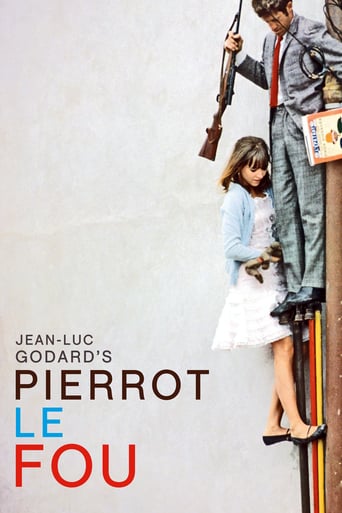
Pierrot le Fou”, represents for me everything I dislike about a Godard movie. Yes, it is true that Godard was a revolutionary filmmaker during the French New Wave of the 1960s’ and he boldly played with cinema style and structure as very few have done since. Once in a while, his off the cuff nonchalant, and improvising style would create something memorable (My life to live, Alphaville). On too many instances however, I feel that what is produced is a mess, made specifically for critics to admire, with no consideration to the audience watching the film. Made before vastly superior films such as, “Bonnie and Clyde” and “Badlands”, “Pierrot le Fou”, tells the similar tale about a young couple engaging in a merciless crime spree. Ferdinand (Jean-Paul Belmondo) married money and is bored with his wife and empty life. He has a young daughter and his new babysitter happens to be an old and sexy flame from his past named Marianne (Anna Karina). Without thinking twice, he leaves his life to run off on a crime spree with Marianne, who keeps talking about a brother with the ability to set them up with money. Whether purposeful or forgotten by the made at the moment script, he ends up abandoning his small daughter sleeping alone in his apartment. It is my opinion that Godard just did not notice this small fact in his story, as it is never even mentioned or hinted at again. This movie has countless such inconsistencies. Throughout the film Marianne keeps referring to Ferdinand as Pierrot, of which Ferdinand keeps trying to correct her. Pierrot, it seems, is a character from a famous Italian stage comedy and opera and was a clown and a fool. Godard is clearly telling us that Ferdinand contains those attributes as well. Which he does. An extensive period of the movie has the couple staying in an isolated area in the French Riviera that allows Godard to entertain himself with some of his famous rambling conversation shots that are never centered and deal with the relationship of the people involved. While many filmgoers dribble with admiration at this inventive cinematic style, I for one think that without an investment in the characters, its whole point gets lost, making it just an empty exercise in style. If there was one movie where it is impossible to get invested or care about the characters, this is the movie. The plot has the couple killing and stealing from gangsters and being pursued by both, and there is an ending full of deceit and betrayal. Following this plotline may give the false impression of an action packed psychological thriller. Nothing could be further from the truth however, because none of the action scenes are filmed straight. Godard uses old tricks from Hollywood’s silent era of Laurel & Hardy and Buster Keaton when showing the acts of violence being portrayed. The problem with this is that none of these scenes are funny, making the bloody results off putting and confusing. If there is one word that can describe the movie best, it would be the word “confusing”. I am sure Godard thought he was being clever when he shows this attractive young couple wondering around their ordinary apartment, doing ordinary things, all the while a dead body is lying in the middle of the living room floor. Sure it is clever as to how he allows the eye glances of the character’s to bring the viewers’ attention onto the dead body, but I kept thinking that the whole point was for him to want us to think he is clever, and nothing else. Many of the more famous scenes of the film gave me the same impression. Like in the beginning of the movie where Ferdinand is attending a high class party, (while Marianne is babysitting his daughter), and all the people in attendance are filmed in a shaded pastel tint while the main character walks through their supposed emptiness until he comes across the American Cult film director, “Samuel Fuller”, who is filmed in regular colors, as he gives his explanation as to what making films is all about. This seemed to me to signify that to Godard truth is sought through movies and not parties, or something to that effect. I thought the scene was just another example of Godard trying to look smart. To top it all off, Godard could not help himself to blatantly stating his political believes about Vietnam and Israel in the middle of his quirky story. His political obtuseness is seemingly placed in the middle of the film without rhyme or reason and makes the movies ending, which I will not reveal, as being quite insulting. But since this ending had no real connection to the rest of the film, it does not really matter. Sometime, when he hits his mark, Godard is fascinating, however for me, most of the time his films are unwatchable. “Pierrot Le Fou”, is one of the most unwatchable of them all.

